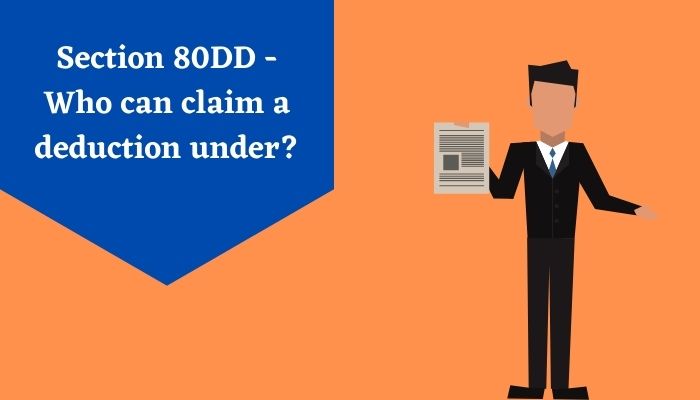Section 80DDB of Income Tax Act
In the last few years, the costs of availing of medical services have risen exponentially. Individuals end up utilising their entire savings just to pay some medical bills! Because of this, it can be a great relief to know that taxpayers can get several deductions under Section 80DDB of the Income Tax Act. Today, we’ll help you understand what these deductions mean and how you can get these deductions too.
What is Section 80DDB of the Income Tax Act?
Taxpayers can get deductions under Section 80DDB for medical expenses. Individuals and Hindu Undivided Families can claim these tax deductions after making sure that certain conditions are followed. We will also be talking about this list of conditions at a later point in this article.
Tax deductions can be claimed under Section 80DDB under Chapter V1-A for the payment of medical expenses that are connected to the treatment of any person suffering from a certain condition.
It should be noted that for getting deductions the entity concerned is residing within India for that taxpayer and the expenditure related to medical treatments is for the individual, a Hindu Undivided Family, or a family member like a spouse, parent, or sibling that is dependent on them.
Understanding the Extent of Deduction that Can be Claimed Under Section 80DDB
The deductions that can be claimed under Section 80DDB can differ according to the assessment year. Let’s look at these deductions for the assessment year of 2019 – 2020.
The actual amount paid for medical treatment or INR 40,000. The option is selected which is lower in value. Senior citizens between the ages of 60 years to 80 years can claim deductions either for the actual amount that was paid for medical treatments or INR 1 lakh, whichever is lower.
Senior citizens over the age of 80 years can claim deduction either for the actual amount paid for the medical treatment or INR 1 lakh. The lowest option out of both choices is selected.
For the assessment year of 2016 – 2017, the actual amount paid for medical treatment or INR 40,000 is the limit. The lowest option out of both options is preferred. For senior citizens between the ages of 60 years and 80 years, then the actual amount paid for medical treatment or INR 60,000 is the limit.
For senior citizens over the age of 80 years, the actual amount paid for medical treatment or INR 80,000 is the limit. For the assessment year of 2015 – 2016, the limit is the actual amount paid for medical treatment or INR 40,000.
For senior citizens between the ages of 60 years and 80 years, the limit is the actual amount paid for medical or INR 60,000. For senior citizens over the age of 80 years, the actual amount paid for medical treatment or INR 60,000 is the limit.
Medical Ailments and Diseases Specified Under Section 80DDB
There are some specific diseases or medical ailments for which one can get tax deductions under Section 80DDB. These specific diseases or medical ailments are:
- Ataxia
- Dementia
- Aphasia
- Hemiballismus
- Dystonia Musculo rum Deformans
- Diseases that are neurological in nature
- Chorea
- Parkinson’s Disease
- Motor Neuron Disease
- Malignant Cancers
- Chronic Renal Failure
- Thalassemia
- Haemophilia
- Haematological Disorders
- Full Blown Acquired Immuno-Deficiency Syndrome (AIDS)
Individuals should also remember if he or she wants to get a tax deduction under Section 80DDB, then he or they must acquire a certificate of the disease. The income tax department has made it easier for individuals to acquire this particular certificate. To do the same, one needs to implement the changes that are mentioned below.
- Patients who avail of medical treatment at a privately owned hospital
- The certificate of the disease can be acquired from the same hospital
- The certificate need not be acquired from a government-owned hospital
- The certificate must only be acquired from a medical specialist. The specialist should also possess a degree in his or her field of specialization that is validated by the Medical Council of India
- Patients that are availing of medical treatment at a government-owned hospital
- The certificate must be acquired via a medical specialist who is employed on a full-time basis at the hospital
- It is mandatory for the medical specialist to possess a general post-graduate degree or an internal medicine degree or similar. This should be validated by the Medical Council of India
- It is not necessary to get the certificate of the disease in Form 101
The Details Required in the Certificate of the Disease
We have mentioned that a certificate of the disease is necessary for claiming a deduction under Section 80DDB of the Income Tax Act. But beyond that, one should be familiar with the details that should be included in the Certificate of the Disease. These details are mentioned below in a list for your convenience.
- The name of the patient
- The age of the patient
- Details of the specialist, including the name, address, qualification, and registration number
- The name of the ailment or the disease that one is suffering from
- Credit score
- If the treatment of the patient is taking place at a government-owned hospital, then the name of the hospital and address of the hospital should be mentioned on the certificate





























